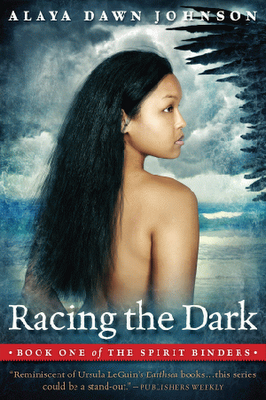Racing the Dark

Racing the Dark is unique among fantasy books. The world draws upon Pacific Island and East Asian cultures to create a rich blend very different from fantasy canon—an island nation with an animist religion centering on sacrifice and binding. Though a young adult novel, Johnson is unafraid to tackle harsh topics, and readers will love her for it.
The book begins with Lana's womanhood trial: the morning of her first bleeding, she must dive alone to prove her worthiness as a diver (like the ama pearl divers of Japan). Her findings mark her as being destined for great things. Lana doesn't want the sort of life the island elders would force on her, so she hides the signs and tries to go on as before. But forces in the world are already shifting. Soon the divers have no gems to collect, and the weather patterns begin to ravage their island. Their way of life dying, Lana and her family leave in search of something better.
What comes next is the slow, inexorable destruction of Lana's idyllic childhood. Their situation worsens and everyone makes sacrifices—and that's sacrifice in the true meaning of the word. Lana is pushed into tighter and righter corners, always trying to stay one step ahead of the monster that chases her.
The book draws on themes of environmentalism, trade offs, personal responsibility, and trust. One has the feeling that nothing is safe—it can all come undone in a moment. This suspense keeps the book moving after a slow start. Though the opening scenes are of obvious interest from a feminist perspective, the book is not centered on issues of gender, which is actually a relief. Johnson's primary characters are mostly women, but their being women doesn't make them extraordinary or weak. They are people drawing on their own strengths to survive. It's a much more human approach that I am grateful for. The banner doesn't always have to be waved in your face for the message to be clear.
This is not to say that Johnson ignores their femininity. In fact, the women involved in romantic relationships with men all struggle with them. How many transgressions can love and affection make up for? Which sacrifices for love are justified, and which are foolhardy? All these women wonder if they should stay with their men—and not one is wholly dependent on him for her survival. This frees the debate to be solely about ethics, self-worth, and love.
As a teen, I would have gobbled Racing the Dark up. As an adult writer, I'm not wholly enchanted, which I put down to this being Johnson's first novel. I do wish I had a niece or young friend to pass it on to, so I could follow the story through her. I am also keeping a close eye on Johnson's other projects. Johnson's writing improves over the course of this book, and I'm certain she will become a reliable force in the fantasy genre.